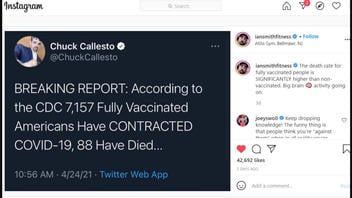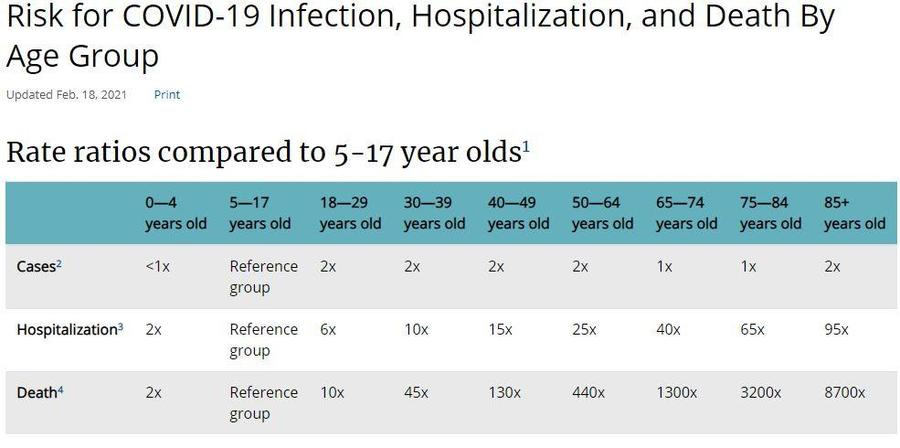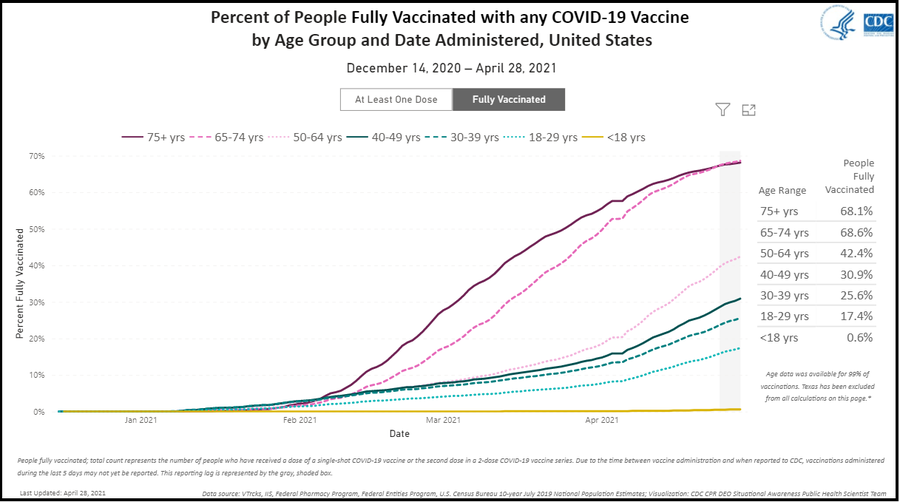
Did the Centers for Disease Control and Prevention (CDC) show the death rate for people fully vaccinated against COVID-19 is higher than the death rate for those who are not vaccinated? No, that's not true: While some of the data cited with the claim are authentic CDC numbers, the agency has not published a death rate comparison that would support a claim that vaccination increases a patient's odds of death, which is what the claim implies.
Plus, there would be limited statistical value in an apples-to-oranges comparison of the U.S. death rates of the two disparate groups. Only about 29% of the U.S. population has been vaccinated as of this writing, the majority of whom are older Americans. Older patients are more likely to die of COVID-19, which would make the comparison misleading, since younger Americans are less likely to have been vaccinated as of the date this was written and are also less likely to die of COVID-19.
The claim was posted as a comment on an Instagram post (archived here) on April 25, 2021 that said: "According to the CDC 7,157 fully vaccinated Americans have CONTRACTED COVID-19, 88 have died." The comment read:
The death rate for fully vaccinated people is SIGNIFICANTLY higher than non-vaccinated. Big brain 🧠 activity going on.
Users on social media saw this title, description and thumbnail:
Lead Stories found no such side-by-side analysis on the CDC's website, nor on the website of the Food and Drug Administration, which is the licensing agency for vaccine makers. Contacted April 28, 2021, the CDC's chief collector of mortality statistics was unaware of such a comparison and has referred questions about differing death rates to biostatisticians at the nation's public health agency. Lead Stories has reached out to them and will update this fact check, as appropriate, when agency staff respond.
A comparison of death rates of vaccinated and unvaccinated persons would require a biostatistician to conduct a weighting exercise to compare deaths by age and occupation, among other variables, since less than one-third of the U.S. has been vaccinated, and most of those vaccinated are older than 50 or are so-called front-line workers at a high risk of infection. In an April 28, 2021, email to Lead Stories, Robert Anderson, Ph.D., chief of the mortality statistics program at the National Center for Health Statistics said that critique would be correct, but added that the numbers of infections in the two groups might also have to be weighted in an analysis of their relative death rates.
The vaccinated and unvaccinated are two very different groups in the U.S., and age strongly correlates to both infection and death rates. People older than 50 are twice as likely to be infected and more than 400 times as likely to die of COVID-19 as are youths and teenagers, as this CDC chart shows:
(Source: CDC screengrab taken Wed Apr 28, 23:51:24 UTC 2021)
That's significant because, as the next graphic shows, the strong majority of those vaccinated against COVID-19 have been older than 50. So, more cases of "breakthrough infection" are likely among the middle-aged and elderly because more of them are vaccinated and because their immune and other systems are less able to fight off COVID-19. "Breakthrough" is what immunologists call the cases of people who are infected even after being vaccinated, which was anticipated after clinical trials of the vaccines showed 80% to 90% effectiveness against the novel coronavirus, not perfect immunity.
(Source: CDC screengrab taken Thu Apr 29, 00:09:49 UTC 2021)
If both the vaccinated and unvaccinated cohorts contained the same proportions of each age group, a comparison might be valid. In Israel, which has vaccinated more than half its population, the Ministry of Health (MoH) reported in a March 11, 2021, joint press release with vaccine-makers that the fully vaccinated population has much better survival rates than those who have not been vaccinated. "These new data build upon and confirm previously released data from the MoH demonstrating the vaccine's effectiveness in preventing symptomatic SARS-CoV-2 infections, COVID-19 cases, hospitalizations, severe and critical hospitalizations, and deaths," said Yeheskel Levy, Israel Ministry of Health director.
A recent CDC review of vaccine effectiveness showed that even among health care workers, who have a high likelihood of exposure to the novel coronavirus, vaccination nonetheless prevented infection as powerfully as clinical trials showed it would in clinical trials that included a much wider cross-section of the population.
Lead author Mark G. Thompson, a Ph.D. infectious disease expert at the CDC, wrote in an April 2, 2021 article for the agency's Morbidity and Mortality Weekly Report that he and more than a dozen colleagues looked at the cases of 3,950 health care personnel, first responders and other essential and front-line workers, testing them weekly for the novel coronavirus (SARS-CoV-2) for 13 consecutive weeks. "Under real-world conditions, mRNA vaccine effectiveness of full immunization (≥14 days after second dose) was 90% against SARS-CoV-2 infections regardless of symptom status; vaccine effectiveness of partial immunization (≥14 days after first dose but before second dose) was 80%."



















